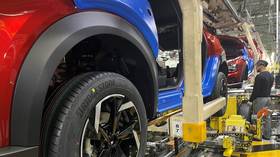Japanese car giants exploring merger to tackle China’s EV strength – media

Japanese car giants Nissan and Honda are in exploratory discussions that could yield a merger between the two, the companies have confirmed in a statement.
The possible joining of the two Japanese firms comes as traditional carmakers grapple with intense competition from Chinese electric vehicle producers, and slower-than-expected global demand for EVs.
News that the two companies have been holding preliminary talks about a merger was first reported by Nikkei late on Tuesday.
Honda and Nissan responded to the reports with identical statements, without providing details or a timeframe for when a deal might be completed.
“As announced in March of this year, Honda and Nissan are exploring various possibilities for future collaboration, leveraging each other’s strengths,” the companies said in a statement on Tuesday. “If there are any updates, we will inform our stakeholders at the appropriate time.”
Among the options, Honda is considering a merger, capital tie-up, or a new holding company under which the combined businesses would operate, its Executive Vice President Shinji Aoyama said on Wednesday, according to The Japan Times.
Over the past few years, Nissan, once a pioneer in EV technology, has fallen behind after Chinese brands such as BYD outperformed it in technology and produced cheaper cars.
Honda has also been under pressure after it announced plans to sell only zero-emission autos in major markets such as the EU and the US by 2040. However, weak demand for EVs amid relatively low fuel prices and a lack of charging infrastructure has hindered the transition from petrol and diesel vehicles to electric.
The combined entity, if created, would have the scale to make investments to compete with Tesla and BYD, experts say.
“Both players stand to gain from this merger,” Vivek Vaidya, senior vice president of mobility at Frost & Sullivan, told Bloomberg on Wednesday. “The combined entity will be a complete automaker.”
According to reports, the tie-up might also include Mitsubishi Motors. The third major Japanese car manufacturer already has capital ties with Nissan, and is reportedly taking part in preliminary talks.
The development comes as many brands are facing competition from booming EV production in China, the world’s largest car market. Chinese consumers have largely shifted from foreign to domestic brands, which have a better perception in the country. The government has also provided incentives to ramp up adoption of EVs and plug-in hybrids.












